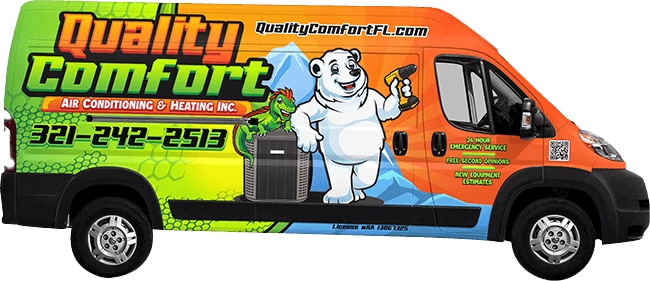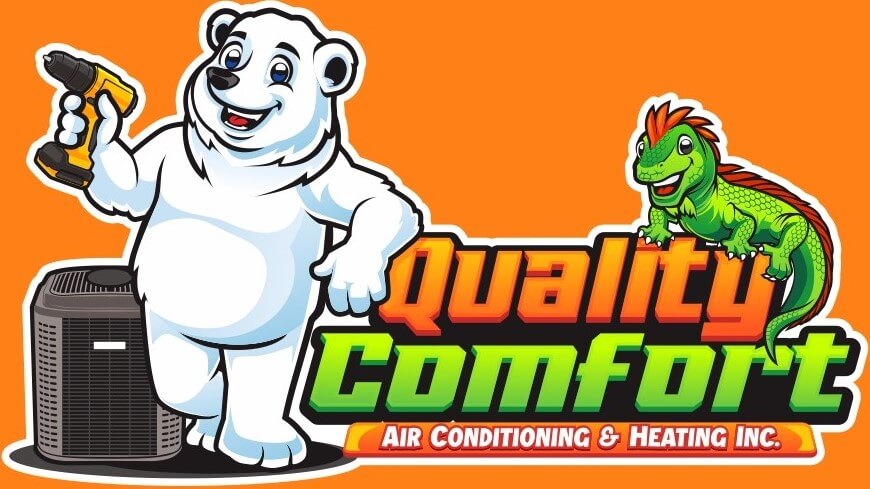


Living in Florida's beautiful coastal regions like Brevard County, Florida comes with its own unique set of challenges, especially when it comes to maintaining and protecting your air conditioning system. The combination of salt air and high humidity can wreak havoc on your AC unit, but fear not! This comprehensive guide on "how to protect your AC condenser in Florida, especially in the coastal areas" will provide you with valuable information and tips, ensuring that you stay cool and comfortable all year long.
Florida's coastal climate presents a unique challenge when it comes to maintaining your AC unit. The salty air and high humidity levels can accelerate the rate of corrosion, particularly affecting the coils of your air conditioning unit. This corrosion can lead to decreased efficiency, increased energy costs, and ultimately, the need for costly repairs or replacement.
To combat these challenges, it's essential to take proper care of your AC unit by regularly cleaning and removing salt deposits. Additionally, applying an industrial-grade protectant can help mitigate damage caused by the harsh coastal environment.
By understanding the effects of Florida's coastal climate on your AC condenser, you'll be better equipped to protect and maintain your cooling system for years to come.
Selecting the right AC unit for your coastal home is crucial in ensuring optimal performance and longevity. A coastal AC system is specifically designed for life by the sea, taking into account the unique cooling requirements of coastal areas. An improperly sized AC unit can lead to accelerated wear and tear, as well as an inability to meet the desired temperature set on the thermostat.
When choosing an AC unit, it's important to consider factors such as the size of the space you need to cool, as well as the unique challenges presented by the coastal environment.
An AC unit for coastal areas should possess several key features to ensure its durability and efficiency. First, it should be made from corrosion-protecting materials that can withstand the salt air and humidity of the coastal environment. Second, it should be designed to accommodate the distinctive climate and weather conditions of a coastal area, such as high winds and extreme temperatures.
Adequate installation and positioning of your AC unit are critical in ensuring long-term protection from salt air damage. The placement of the ac condenser unit must be taken into consideration since it has a major part in order to keep away from salt air damage. It is therefore essential to be careful with choosing its location.
By taking the time to ensure proper installation and positioning of your AC unit, you can help safeguard it from the corrosive effects of salt air and extend its lifespan. This not only saves you money on costly repairs and replacements but also ensures that your cooling system remains efficient and effective throughout the year.
At Quality Comfort Air Conditioning And Heating Inc. We apply rubberized undercoating and coil coating to help protect your ac condenser. We also offer additional protection for new air conditioning systems from Salt Sheild
In coastal areas, incorporating natural barriers can offer additional protection for your AC unit. It's important to note that while trees and shrubs can serve as barriers against salt spray or sprinkler spray, they should be positioned a few feet away from the AC condenser unit. It's also crucial to be aware that these natural barriers may still be susceptible to penetration by salt water, sprinkler water, and wind.
To optimize the location of your AC unit, it's beneficial to understand the prevailing wind direction in your area. By strategically placing your AC unit to minimize its exposure to salt air and ocean winds, you can enhance its resistance to corrosion and damage. This proactive measure ensures that your AC unit remains efficient and has a longer lifespan.
Considering these factors, utilizing natural barriers and being mindful of wind direction can significantly contribute to the protection and longevity of your AC unit in coastal regions.
Regular maintenance and cleaning are essential for AC condenser units in coastal areas. Yearly and bi-annual air conditioning service is strongly recommended to ensure the system runs optimally, detect any failing or damaged parts before they become major and costly repairs, and clean off the salt accumulating in the nooks and crannies of the system.
Maintaining the area surrounding the condenser unit is also crucial for its optimal performance. Keeping the area free of dust, dirt, and debris can prevent clogs and hindrances to the unit's ability to release heat and drainage leading to improper functioning.
By performing regular maintenance and cleaning, you can help ensure the efficiency and longevity of your AC unit in a coastal environment.
For homeowners who prefer to maintain their AC units on their own, there are several helpful DIY cleaning tips to keep in mind. One crucial step is to ensure the area around the condenser unit remains clear of debris by raking and trimming any nearby bushes. This prevents buildup on the fins and ensures the drain holes remain unobstructed.
If you notice that the coils of your AC unit have become clogged with pollen, dirt, or dust, you can use an outdoor coil cleaner to effectively clean them. However, it's important to note that if the coils are excessively dirty, it is best to entrust the task to a trained professional. When using a hose to clean the coils, exercise caution and apply minimal pressure to avoid bending or damaging the delicate coil fins. Bent or damaged coil fins can restrict airflow, leading to higher high-side pressure, reduced cooling capacity, decreased efficiency, and even potential compressor failure.
By following these DIY cleaning tips, homeowners can contribute to the maintenance and longevity of their AC units. Remember to prioritize safety and seek professional assistance when necessary to ensure optimal performance and efficiency.
By regularly cleaning your AC unit and addressing any potential issues, you can save money on energy costs and prolong the life of your cooling system.
There are times when it's best to enlist the help of a trained HVAC professional for cleaning and maintaining your AC unit, especially if you're dealing with particularly dirty or clogged components. Quality Comfort Air Conditioning And Heating Inc. are highly recommended for AC maintenance in coastal areas such as Cocoa Beach, Satellite Beach, Indian Harbor Beach, Indialantic Beach, Melbourne Beach, and other coastal areas in Brevard County, Florida
By seeking professional help when necessary, you can ensure that your AC unit is properly maintained and functioning at its best. This not only saves you money on costly repairs and replacements but also ensures that your cooling system remains efficient and effective throughout the year.
Taking protective measures for your AC condenser is essential in ensuring its longevity and efficiency in coastal areas. Applying an anti-corrosion coat or a coastal coating can be the most effective method for protecting your AC unit from saltwater corrosion. Additionally, it's important to rinse the coils and fan blades with a hose periodically to prevent salt buildup.
By implementing these protective measures, you can help ensure the continued efficiency and longevity of your AC unit in a coastal environment.
AC unit covers serve a vital role in protecting your AC unit from the harsh coastal environment. Vinyl and canvas are considered the most suitable materials for AC unit cover due to their durability and waterproof properties. These covers can help safeguard your AC unit from saltwater corrosion and damage caused by humidity. but it's very important to remember to remove these covers before you turn on the system or it will damage the system.
When choosing an AC unit cover, it's important to select one that is specifically designed for your unit's size and model. This ensures a proper fit and optimal protection from the elements. By investing in a high-quality AC unit cover, you can help protect your cooling system from damage and extend its lifespan.
Corrosion inhibitors are compounds used to protect metal surfaces from corrosion and are particularly essential for AC units in coastal regions. A two-part hybrid corrosion inhibitor, and a zinc-based corrosion inhibitor.
Applying corrosion inhibitors according to the manufacturer's instructions can help prolong the lifespan of your AC unit by protecting it from corrosion and damage caused by the salty air in coastal areas. This, in turn, can help minimize the need for expensive repairs and replacements, ensuring that your cooling system remains efficient and effective throughout the year.
Regular monitoring and addressing potential issues with your AC unit in coastal areas is crucial for its optimal performance. Saltwater corrosion is a common issue due to the high salt content in the air, causing the accelerated deterioration of metals such as aluminum and steel, resulting in premature breakdown and wear out of your AC unit.
By performing regular maintenance and cleaning, you can help ensure the integrity of your AC unit and address potential problems before they become costly repairs. This not only saves you money on energy costs and repairs but also ensures that your cooling system remains efficient and effective throughout the year.
Storm season in coastal areas can bring about additional challenges for AC unit owners. To ensure the safety and efficiency of your AC unit during storm season, it's essential to take the necessary precautions. Deactivate the power supply to your AC unit and make sure the ac condenser is anchored properly with Florida Building Code-approved anchors.
Additionally, take measures to protect your outdoor air conditioner or condensing unit by covering it with a tarp or plywood to shield it from flying debris. By taking these steps, you can help ensure the continued efficiency and longevity of your AC unit during storm season, keeping your home cool and comfortable.
Living in Florida's coastal areas comes with unique challenges when it comes to maintaining and protecting your AC unit. By understanding the impact of the coastal climate, choosing the right AC unit, and implementing proper installation, maintenance, and protective measures, you can help ensure the continued efficiency and longevity of your cooling system. Stay cool, comfortable, and confident in the knowledge that you're well-prepared to face the unique challenges of living in a coastal environment.
To protect your A/C condenser first shut it off to prevent short cycling which could lead to damage. If possible protect the unit and make sure there is no debris near the system and trim bushes and tree limbs that could damage the ac condenser unit
Additionally, applying car wax can help preserve its appearance.
It is possible for sprinklers to damage an AC unit, as the water spray from the system or well can cause corrosion and rust on the unit's housing.
It is recommended that homeowners be aware of where their sprinklers are spraying in order to help avoid potential damage.